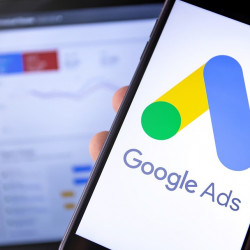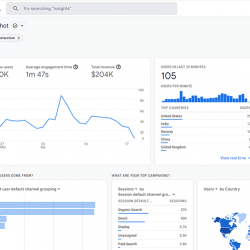To measure the success of your campaigns, you can track them against your KPIs (Key Performance Indicators). If you find that some campaigns aren't working as well as they should, you know where your efforts need improvement.
How do you know where to focus?
 Setting your KPIs isn't a one size fits all kind of situation. You need to look at your business goals and what would define a successful campaign compared to them.
Setting your KPIs isn't a one size fits all kind of situation. You need to look at your business goals and what would define a successful campaign compared to them.
For example, if your business goal is to raise brand awareness, you need to look at your impressions and number of clicks. However, if you want to generate more leads, you should be looking at your conversions.
So what are some of the common KPIs you can track?
Clicks
The number of clicks will tell you how many users are clicking on your Ads and getting onto your site. If people aren't clicking through to your site, you won't be able to convert them to purchasers or subscribers.
It can also give you an indication of whether you're wasting your budget in certain areas. For example, you could see that you have some keywords generating a large number of clicks, but then others are only getting one or two clicks per month.
If your business goal is to raise awareness, you're better off removing the low-performing keywords and focusing on those that are getting you results.
Click-Through-Rate (CTR)
This is the ratio of people who clicked on your Ads compared to the number of people who viewed them. For example, if everyone who saw your Ad clicked on it, you would have 100% CTR. However, if only 5 out of 100 people clicked on it, you would have a 5% CTR.
Google shows Ads with a good CTR more than those with a low CTR. Because of this, it is good to try and get a high CTR for all your Ads. Just remember, most advertisers have a low CTR, so don't be dismayed if you're in single digits; you're not alone.
Keeping an eye on your CTR can indicate whether people like your Ad copy or whether you need to change your message.
Cost Per Click (CPC)

In most instances, you'll be paying for clicks on your Ads, hence the name Pay Per Click advertising.
The amount you bid per click can affect your campaign performance, although it isn't the only performance indicator there is.
The better your Ad copy is, and the better you target your Ads, you can see a lower CPC. So if you're seeing that you have to pay more than usual for your clicks, it could indicate that something in the account isn't working as well as it used to.
Conversion rate
Your conversions are the desirable actions visitors make on your website, for example, newsletter sign-ups or purchases.
The conversion rate is the ratio of how many clicks lead to a conversion. For example, if every click led to a conversion, you would have a 100% conversion rate.
A low conversion rate could mean that your call-to-action within your Ads is poor or that there's something on your website preventing your visitors from converting.
Cost per conversion (CPA)
It's not always easy to work out how much a conversion is worth to you. If you're selling a product that's worth £10, but you're spending £200 to get one conversion, you could be losing money on your advertising.
Keeping an eye on your CPA can let you know if you have any wasted efforts in your campaigns.
Return on Ad Spend (ROAS)
If you have a specific product that you can sell for a fixed price, it's easy to work out your ROAS; it's a simple ratio of income compared to Ad spend.
If you have a ROAS of 3, that means that for every £1 you spend, you're getting £3 back in revenue.
By keeping an eye on your ROAS, you can see where your best-performing campaigns are and where you may need to spend some time improving your campaigns.
Quality score
Your quality score relates to how relevant your keywords and Ads are. For example, if someone searches for "tennis racquets", clicks on your Ad for "New Tennis Racquets" but then ends up on a page for badminton shuttlecocks, you'll have a low quality score.
However, if the visitor goes through to a page that shows them new tennis racquets, this is what they're looking for, so it will have a high quality score.
If you have a lower quality score on your keywords, then it's likely you'll be paying more to show your Ads for them, so it is worth keeping an eye on them.
So, which ones do I need to be looking at?
As we've previously covered, there is no one-size-fits-all solution to KPIs; which ones you need to keep an eye on will depend on your business goals and what you're hoping to achieve from your campaigns.





